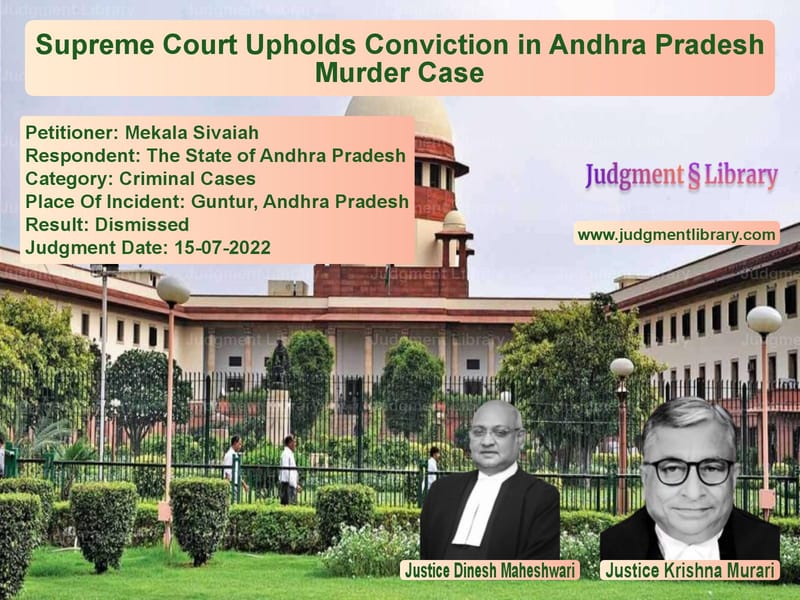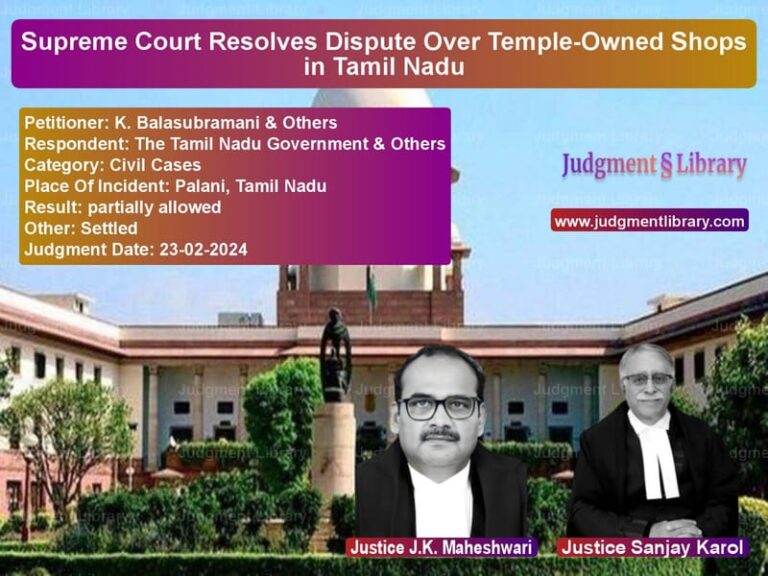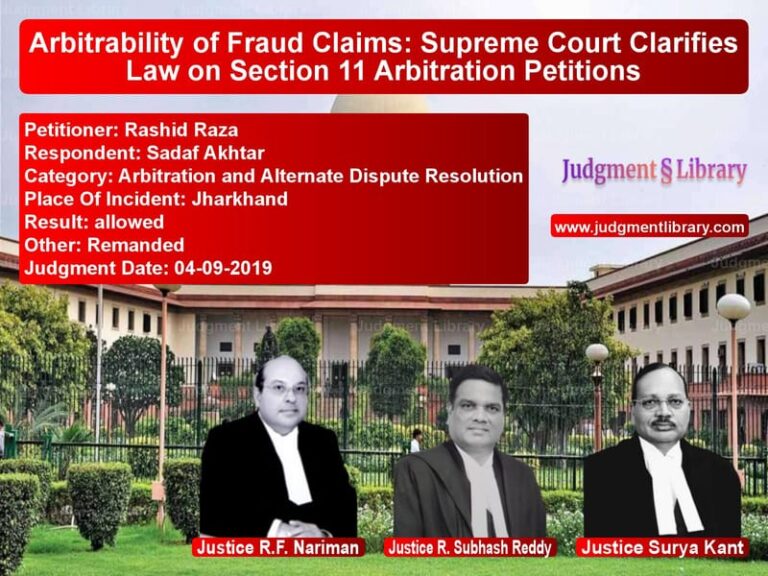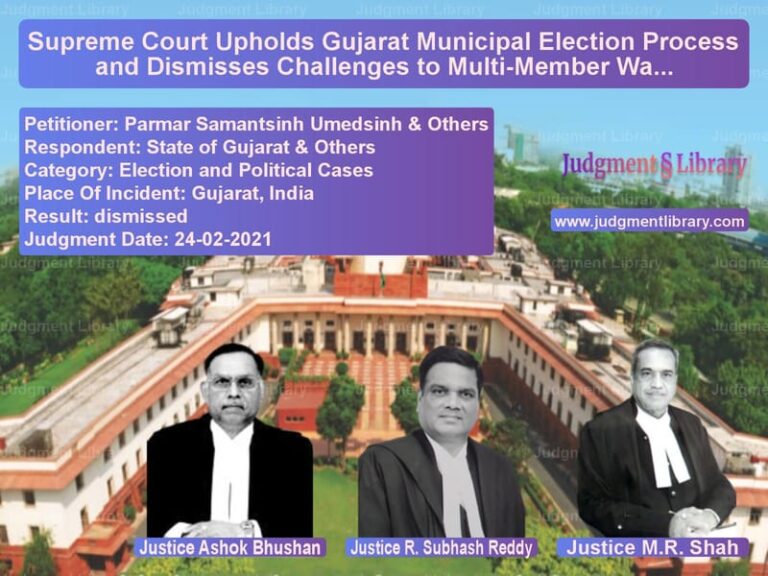Supreme Court Upholds Conviction in Andhra Pradesh Murder Case
The Supreme Court of India, in the case of Mekala Sivaiah vs. The State of Andhra Pradesh, upheld the conviction of the appellant for the murder of a villager in broad daylight. The Court dismissed the appeal, reinforcing the principle that minor contradictions in eyewitness testimony do not undermine a conviction when supported by medical and corroborative evidence.
Background of the Case
On September 6, 2006, the deceased, accompanied by his son (PW-1), went to Lemalle Village’s market to sell vegetables. While the deceased was purchasing tobacco leaves from PW-3’s shop, the appellant, armed with a knife, threw chili powder into his eyes and stabbed him in the chest and abdomen. The accused fled the scene, and the injured man was taken to Government Hospital, Amaravathi, where he succumbed to his injuries.
The police registered an FIR (No. 120/2006) under Section 302 IPC and conducted an investigation. The trial court convicted the appellant and sentenced him to life imprisonment, a decision later upheld by the Andhra Pradesh High Court. The appellant then approached the Supreme Court.
Key Legal Issues
- Was the conviction justified despite the alleged contradictions in eyewitness testimony?
- Did the prosecution prove the guilt of the appellant beyond a reasonable doubt?
- Was the non-recovery of the murder weapon fatal to the prosecution’s case?
Arguments Presented
Appellant’s (Mekala Sivaiah) Arguments:
- The knife allegedly used in the crime was not recovered, weakening the prosecution’s case.
- There were contradictions in the statements of eyewitnesses (PW-1 to PW-4), making their testimony unreliable.
- The prosecution failed to examine the scribe of the FIR and delayed sending the FIR to the magistrate.
- The appellant had a serious leg injury for six months before the incident, making it improbable for him to commit the crime and flee.
Respondent’s (State of Andhra Pradesh) Arguments:
- Eyewitnesses identified the appellant, and their statements remained consistent on material aspects.
- The non-recovery of the weapon did not discredit the prosecution’s case, as there was sufficient direct evidence.
- Medical evidence confirmed the cause of death and was consistent with eyewitness accounts.
- The motive for the crime was established due to prior enmity between the appellant and the victim’s family.
Supreme Court’s Observations and Ruling
The Supreme Court found no merit in the appeal, upholding the concurrent findings of the trial court and High Court. Key observations included:
- Minor contradictions in eyewitness testimony are natural and do not vitiate a conviction if the overall evidence is reliable.
- Non-recovery of the murder weapon is not fatal when there is ample direct and medical evidence.
- The inquest report confirmed that multiple eyewitnesses saw the appellant attack the deceased.
- The appellant’s alleged physical incapacity due to a leg injury was unproven and contradicted by his ability to flee the scene.
The Supreme Court stated:
“When there is ample ocular evidence corroborated by medical evidence, mere non-recovery of the weapon would not materially affect the prosecution’s case.”
Accordingly, the Court dismissed the appeal, upholding the conviction and sentence.
Key Takeaways from the Judgment
- Eyewitness testimony, if consistent on material aspects, remains credible despite minor contradictions.
- Medical evidence plays a crucial role in corroborating eyewitness accounts.
- Non-recovery of the murder weapon does not necessarily weaken a case if there is direct evidence.
- Prior enmity can establish motive but must be supported by direct evidence.
Impact of the Judgment
- Reaffirms the principle that minor inconsistencies in witness testimony do not invalidate a conviction.
- Strengthens legal precedent on evaluating evidence in murder trials.
- Clarifies that procedural lapses, such as delayed FIR submission, do not automatically lead to acquittal if the overall case is strong.
Conclusion
The Supreme Court’s ruling in this case upholds the importance of eyewitness testimony and medical evidence in criminal cases. By dismissing the appeal, the Court reinforced the principle that factual inconsistencies must be assessed in context and that overwhelming evidence cannot be disregarded due to minor procedural lapses. This decision serves as a guiding precedent in evaluating criminal trials and evidence assessment.
Petitioner Name: Mekala Sivaiah.Respondent Name: The State of Andhra Pradesh.Judgment By: Justice Dinesh Maheshwari, Justice Krishna Murari.Place Of Incident: Guntur, Andhra Pradesh.Judgment Date: 15-07-2022.
Don’t miss out on the full details! Download the complete judgment in PDF format below and gain valuable insights instantly!
Download Judgment: mekala-sivaiah-vs-the-state-of-andhra-supreme-court-of-india-judgment-dated-15-07-2022.pdf
Directly Download Judgment: Directly download this Judgment
See all petitions in Murder Cases
See all petitions in Bail and Anticipatory Bail
See all petitions in Judgment by Dinesh Maheshwari
See all petitions in Judgment by Krishna Murari
See all petitions in dismissed
See all petitions in supreme court of India judgments July 2022
See all petitions in 2022 judgments
See all posts in Criminal Cases Category
See all allowed petitions in Criminal Cases Category
See all Dismissed petitions in Criminal Cases Category
See all partially allowed petitions in Criminal Cases Category







